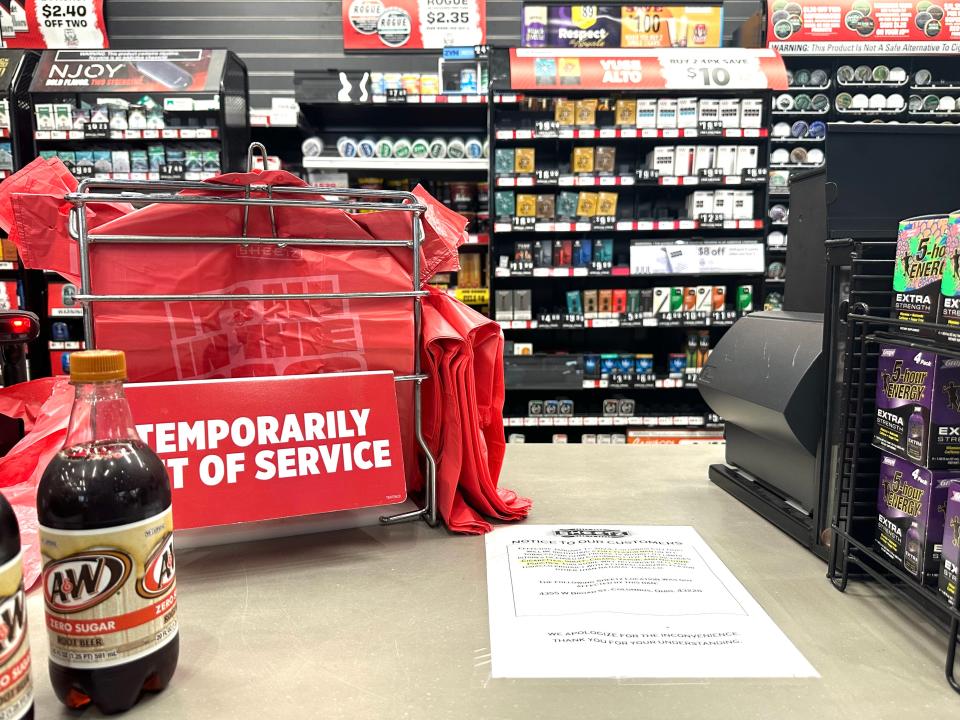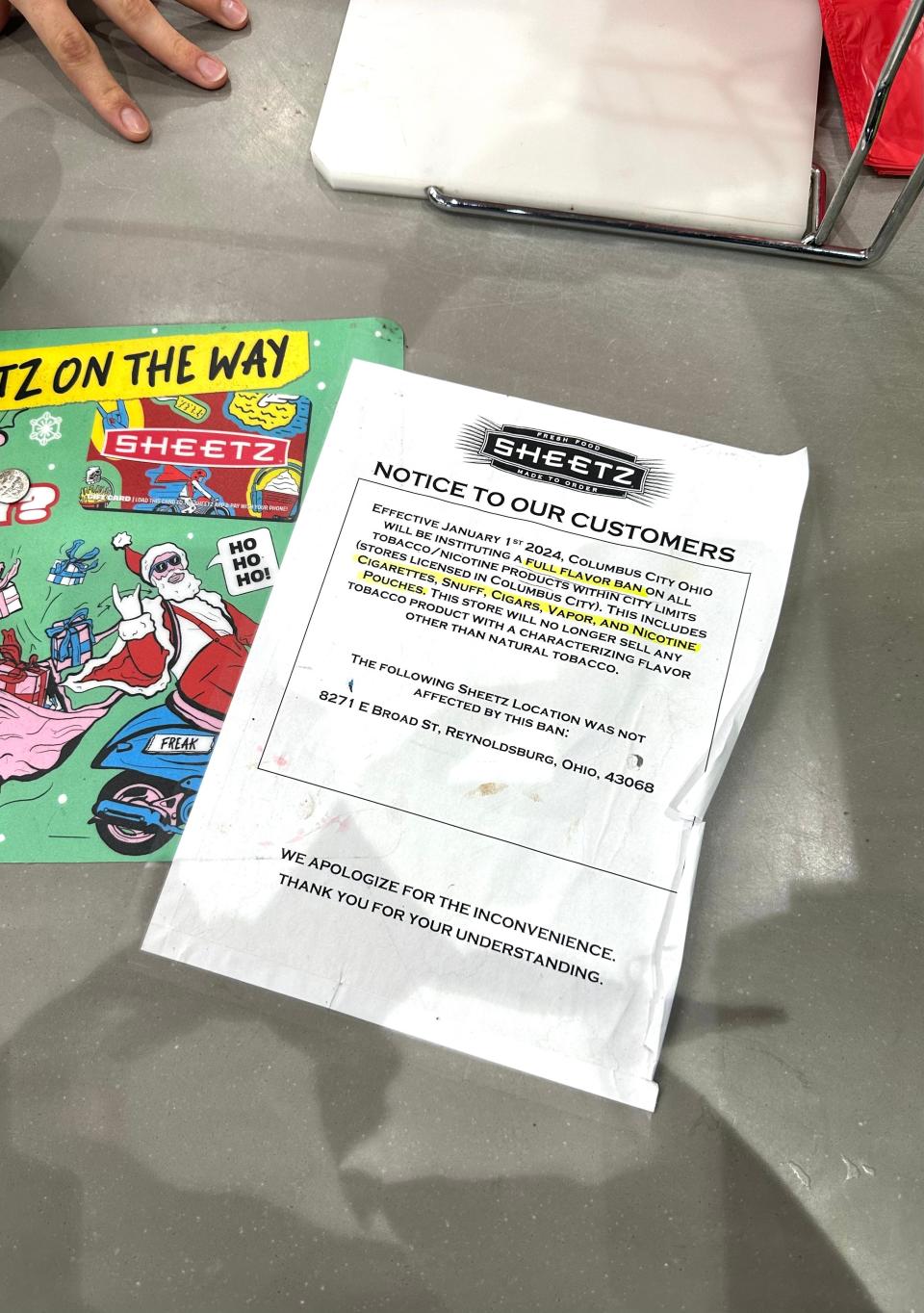Columbus ban on flavored tobacco begins Jan. 1 as state lawmakers aim to snuff it out
- Oops!Something went wrong.Please try again later.
A sign explains the empty slots meant for flavored cigarettes and vapes inside the Sheetz gas station at 744 Grandview Avenue and directs customers to Grove City or Reynoldsburg, the closest Sheetz stops for anyone seeking a menthol nicotine fix or strawberry, mango or gummy bear vape.

The store is one of more than 800 in Columbus where selling smokes or vapes with "distinguishable" flavorings other than natural tobacco will be outlawed beginning Jan. 1.
Read More: Columbus' new ban on flavored tobacco products faces challenge from Ohio lawmakers
That means that most Columbus suburbs may become destinations for those who purchase menthol cigarettes like Newport or Salem, or vape products with an entire menu of flavors, both of which critics say are targeting young and vulnerable smokers and more easily hooking them to a dangerous life-long habit.
Along with Columbus, its suburbs of Bexley, Grandview Heights and Worthington either have or will have, similar outright bans on flavored tobacco and vape products. But all other suburbs, notably Dublin, Gahanna, Grove City, Hillard, New Albany, Reynoldsburg, Upper Arlington, Westerville and Whitehall are open for business in what many consider a lethal, habit-forming, exploitative trade.
"The kids pick up a vape because of the flavor, and they get hooked on it because of the nicotine," said Dr. Rob Crane, president of the Preventing Tobacco Addiction Foundation.
An attack on public health ... and home rule
The Ohio House voted earlier this month to override Gov. Mike DeWine's veto of a state law passed a year ago and included in a state budget in July that would prohibit cities from banning flavored tobacco products.
State lawmakers have argued that they, not local governments, should have broad controls on the issue, such as penalizing merchants selling tobacco products to those under 21.
At the time of his veto and a second veto to thwart a provision in a budget bill to curtail local government controls again, DeWine said: “When a local community wants to make the decision to ban these flavors to protect their children, we should applaud those decisions."
The recent laws targeting local government intervention also attack the home-rule authority that cities strongly adhere to, said Dustin Holfinger, state government relations director for the American Heart Association.
Asked why state lawmakers would try to preempt local restrictions or bans on a product that has been proven to be harmful, if not deadly, to children, Holfinger said it's as much a power struggle with liberal-leaning cities.
"I think it's a control battle between the Republican state legislature and the Democrat-run cities, just like we've seen with the gun issues," Holfinger said.

If the Ohio Senate, which reconvenes in January, also votes to override the veto, state law would be set back decades, said Holfinger.
"It would negate not just the flavored tobacco ban but also the licensing programs that prohibit underage sales," he said. "It would roll Ohio's enforcement policies back by decades."
Bans aren't the only curb on tobacco
Stopping short of outright bans on flavored tobacco, Columbus suburbs have enacted tobacco retail license requirements, forcing retailers to pay a license fee and be subject to bi-annual inspections to ensure those under 21 aren't buying any kind of tobacco.
In addition to Bexley, Columbus, Grandview Heights and Worthington − which will have outright bans on flavored products − they also have license requirements as do Reynoldsburg, Whitehall and Gahanna, whose city council unanimously passed its license requirement law Dec. 18.
Gahanna's law will apply to the city's 26 retailers selling tobacco products when it takes effect March 1, 2024.
If a store is caught selling tobacco products to individuals under 21, the license holder will face penalties, escalating by several hundred dollars with each violation. If the store continues to violate the law, its license will be revoked, and it will be illegal for it to sell any kind of tobacco product.
The city stopped short of an outright ban, however.
"They really wanted to see how effective it is," said Holfinger, "and then to move forward later with a flavor ban."
Twenty-five Ohio cities have enacted tobacco retail license laws, said Holfinger.
State lawmakers threaten decades of progress
Since indoor smoking bans were passed in 2006, there has been steady progress in limiting tobacco access to children and reducing smoking in adults.
"We've had smoke-free laws for 25 years," said Crane of the Preventing Tobacco Addiction Foundation. "It's spread throughout central Ohio."
Focusing on the vaping trend is critical to preventing nicotine habits that too often extend into adulthood, he said.
More than 25% of the cigarette market is comprised of menthol brands. But some 90% of vaping products are flavored, Crane said.
If state lawmakers succeed in overriding DeWine's veto, it will be a loss for health advocates and children, Crane said.
Conversely, if DeWine's veto is upheld and legal challenges are exhausted, kids will benefit, and healthcare advocates will celebrate. But the battle will likely continue, Crane said.
Determined to maintain market share, tobacco and vaping companies "will simply dial back their flavors and mix them up," doing just enough to remain legal while promoting "a persistent fad."
A core principal of the Ohio Municipal League is maintaining local control for its 926 member communities, said Bevan Schneck, public affairs director. "We always want local leaders to make local decisions."
Crane agrees, especially when the decision deals with a critical public health issue.
"The House's disrespectful slap in the face to these leaders and home rule is extreme and reckless. It will result in early addiction and premature death for hundreds of thousands of young Ohioans. We can only pray the Senate will stand with our kids, not Big Tobacco.”
dnarciso@dispatch.com
This article originally appeared on The Columbus Dispatch: Some lawmakers want to snuff out Columbus ban on menthol cigs and vapes

